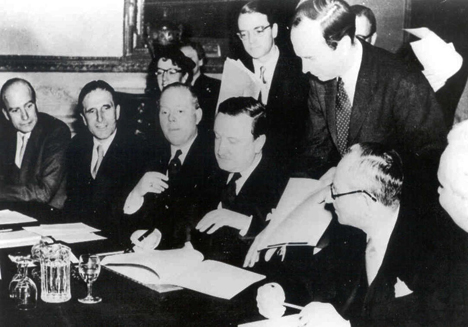“Functionally differentiated societies”, in which the economy, politics and morality constitute discrete spheres, and where market prices alone regulate supply and demand, are considered amoral in social and economic theory. However, it is not as if market actors entirely exclude emotions, ethical reasoning and morality from their economic activities. They certainly purchase a product where it is cheapest, but can they be sure of being correctly informed? And would they buy from a seller who explicitly opposes their own norms or uses the funds from the sale for a harmful cause? They may well do so as long as such things are not spoken about during the transaction, but there are cases of boycotts against, for example, ethnic groups (Jews), companies (Shell) or products (genetically modified food). Moralizing takes place in markets on all sorts of levels, ethical consumption being but one variety among others.
Moral considerations are ubiquitous in economic life, as anthropologist and Occupy activist David Graeber reminds us when drawing attention to the intensity with which notions of “debt” are bound up with moral obligation, guilt or even sin. The etymological connection is probably nowhere as close as it is in German: the Middle High German “schulden” means to be obliged, to owe thanks or to be indebted. The link persists in the monetarization of moral obligations and the moralization of monetary demands. People are, as a rule, convinced that debts have to be repaid, and this conviction lies at the core of the relation between money and morality – although people tend to be mistrustful of professional moneylenders. Anti-Semitism is rooted in this attitude, as are reservations about “the banks”.
The link is expressed in terms of money and its “capacity to turn morality into a matter of impersonal arithmetic – and by doing so, to justify things that would otherwise seem outrageous or obscene”. Thus David Graeber, who takes the thoughts of sociologist Georg Simmel and develops them into a theory of the relation between debt and moral obligation over the past 5000 years. In 2006, Peter Sloterdijk posed some related questions: “Is there an alternative to the blind accumulation of value? Is there an alternative to the chronic trembling in the instant of taking stock? Is there an alternative to the unrelenting compulsion to pay off one’s debts?”
That was a couple of years before the current Greek crisis, though debt crises had already ruined whole national economies and societies, even as debts arising from (neo)colonial irregularities were allowed to lapse. The enraged in today’s Athens are now laying claim to the latter. They would gladly see the crisis (Greek public debt amounts to 175 per cent of the country’s GDP) resolved in a manner other than that demanded by the advocates of forced repayments. For the latter strangle societies rather than prompting, as per Joseph Schumpeter’s theory of creative destruction, an entrepreneurial euphoria.
The dirigiste treatment of “the” Greeks by the “troika” (aka “the institutions”), the pressure aggressively exerted on Greece in the mass media, and the impatience of well-intentioned observers: all of this points to how Greece has been thrown into a debtors’ prison and chained to a burdensome past. The result is, at best, the colonization of the country’s future; at worst, denying Greece any future whatsoever. Now that populist powers in Greece on both the right and the left are turning away from Europe and the West, and seeking cooperation with Russia, alarm bells are ringing.
The Germans, from their experience of repayments and paying compensation after 1918 and 1945 (rightly so), must know how it feels to be in such a situation. It is therefore no surprise that the Greeks, in their unwillingness to pay, have reminded their German taskmasters of the Holocaust and Nazi occupation and are now making their own demands for compensation. These relate to war crimes committed by the SS and the Wehrmacht; and to the repayment of the 476 million reichsmarks that the Deutsches Reich forced the Greek National Bank to lend it in 1942, in order to finance the German occupation. (Even the Nazi leadership had announced that it would repay the loan after the end of the war.) In contrast to assertions made in the German courts and official documents, every Greek government since 1950 has insisted that these demands have in no way been satisfied through the London Debt Agreement of 1953 or the Two Plus Four Treaty of 1990.
The best-known example of a Greek compensation claim for war crimes concerns the massacre of Distomo on 10 June 1944, an act that is as yet unatoned for. According to the findings of the regional high court in Bonn, the events in this central Greek village are as follows: in a “retaliation measure”, the 4th SS Polizei Panzergrenadier Division murdered 218 villagers who had not participated in partisan fighting. The village was razed to the ground, the victims were old people, women, children and infants. The atrocities were beyond imagination, as Der Spiegel reported in January 1988: “Men and children alike where shot at random, women raped and butchered, with soldiers hacking the breasts off of many of them. Pregnant women were slit open, some victims were executed with bayonets. Others were beheaded or had their eyes gauged out.”
These deeds have still not been dealt with under criminal law. Compensation to the tune of 37.5 million euros remains outstanding, following a 1997 ruling against the Federal Republic of Germany by a court in Livadia, Greece, on behalf of the descendants of the victims of the massacre of Distomo. The Greek government has until now refused to grant its consent for a related foreclosure process to commence, concerning assets belonging to the Federal Republic of Germany (including the seizure of the Goethe Institute in Athens). Regional courts in Bonn and Cologne, the Federal Court of Justice and the Federal Constitutional Court, as well as international courts, have dismissed civil law actions. The highest German courts have argued that, when considered under the Hague Conventions, the massacre was a military operation; the Federal Constitutional Court therefore has not recognized it specifically as a Nazi crime. What would today be considered a blatant breach of international law is considered a normal act of war when viewed in the context of the time in which it was committed.
Meanwhile, an action seeking to have German property in Italy confiscated was brought before the Italian Court of Cassation in Rome, as the highest Italian civil court. The action was however declared inadmissible by the International Criminal Court in The Hague and state immunity confirmed: states cannot be sued by individuals from foreign states. The Japanese president of the International Criminal Court, Hisashi Owada, expressed regret and astonishment at the outstanding compensation and recommended the commencement of political negotiations. Here the logic of the “reciprocity of exchange” must come to bear. The French sociologist Marcel Mauss drew attention to this kind of logic, as did John Maynard Keynes, with reference to the treatment of the German Empire after World War I. The crux of the matter lies in requesting reparations to be paid, but at a rate that does not spawn revanchism and that casts the debtor both as a future partner and as an actor that can contribute to Europe’s general wellbeing.
It is well known that the demands of the Treaty of Versailles were exacted ruthlessly, such that by 1932, the Weimar Republic could be disregarded by its opponents. After World War II, the western Allies applied a different logic: more important than repayments was the contribution made to a supranational economic community that could succeed politically as a community of peace and development and overcome European nationalisms. The London Conference of 1952/3 tailored debt obligations to the economic capacities of the new Germany. “Lenient” creditors paradoxically facilitated an “economic miracle” and Germany’s comeback as an économie dominante.
Germans carry a particular responsibility, as the historian Constantin Goschler argues: “The German comeback after World War II had much to do with the generosity of their former adversaries, who could in turn count on profiting from West Germany’s economic strength. However, the question of reparations should not be instrumentalized for the purposes of short-term political gains, particularly since the problem can only be properly handled in the context of Europe as a whole, given the large number of countries affected. There is an urgent need to discuss anew the basis for the reciprocity upon which European integration and peace after 1945 were based.”
Is there an alternative to the Greek debt cycle and that of other “debtor countries”? Could there be forgiveness in lieu of repayments and freedom in lieu of debt bondage? “In a transcapitalist economy, the progressive, creative, giving and excessive gestures must become constitutive. Only operations that are engaged for the sake of the future have the power to explode the law of exchanging equivalences, by way of forestalling becoming-guilty and going into debt.” Only a radical break with the “odious business of repayments” can pave the way for a new beginning that allows freedom to be restored – probably to the surprise of the injured parties themselves.
In Greece, a debt conference and debt relief in a form akin to the London negotiations of 1952/3 is repeatedly encouraged or suggested. But copycat solutions of this sort are impossible for many reasons: Greece has neither caused and lost a war, nor could negotiations of this kind be conducted behind closed doors as they were at the beginning of the 1950s, including with regard to compensations to Israel too (against public opinion in both countries). Nor can debt relief be allowed to distract from demands for the domestic reform of the Greek administration. The current challenges surrounding Greek public debt and Germany’s historical responsibility will have to be embedded in a new kind of context for negotiations. The same applies to challenges presented by the share of responsibility that international financial markets and European banks now carry. In this new context, debt relief and questions of tax justice would also have to be considered, as well as how to determine reparations and individual compensation.

Wind turbines on the Panachaiko, Greece. Photo: Koliri. Source:Wikipedia
Talk of “lazy Greeks” and paranoia concerning “Merkelism” has to stop, but it’s not only a case of easing rhetorical tensions between Greece and the EU countries. Political and economic relations need to be established that provide Greek society with a future in Europe. Even more important than dealing with the past is future-oriented investment in areas such as alternative renewable energy, which can release Greece from the grip of the oil import industry, allow for a low emissions reindustrialization and enable the export of clean electricity to the Balkans. This would enable more sustainable tourism, environmentally friendly agriculture and the advancement of a knowledge economy.








